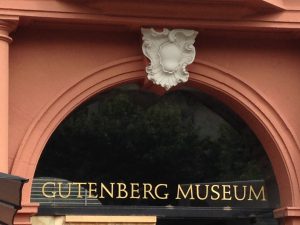Stories make us more alive, more human, more courageous, more loving.
–Madeleine L’Engle

Libraries are full of stories; the fiction and biographies that fill our book shelves, the stories that students create in our libraries, the stories that each person brings to our library–all of these are important and different.
In the distant past, stories were part of our oral tradition, they were told and retold from one person to another. Even when famous works such as the Bible were first printed, books were so expensive and slow to produce (up to 10 years in one volume) that only the wealthiest of people could see them, and of course reading and literacy were only available to those who had the time and social status to learn to read.
 According to Wikipedia, “The movable type printing press changed all that. In Renaissance Europe, the arrival of mechanical movable type printing introduced the era of mass communication which permanently altered the structure of society. The relatively unrestricted circulation of information—including revolutionary ideas—transcended borders, captured the masses in the Reformation and threatened the power of political and religious authorities; the sharp increase in literacy broke the monopoly of the literate elite on education and learning and bolstered the emerging middle class.1”
According to Wikipedia, “The movable type printing press changed all that. In Renaissance Europe, the arrival of mechanical movable type printing introduced the era of mass communication which permanently altered the structure of society. The relatively unrestricted circulation of information—including revolutionary ideas—transcended borders, captured the masses in the Reformation and threatened the power of political and religious authorities; the sharp increase in literacy broke the monopoly of the literate elite on education and learning and bolstered the emerging middle class.1”
In the 21st century, stories can be told in multiple ways via blogs, ebooks, digital film, and even social media. The best stories are ones that move us, change us and embrace us into the book/story. The reader understands the story and the characters and thus is taken to a new level of understanding. We owe much of this to the invention of Mr. Johannes Gutenberg in 1439. I visited the Gutenberg Museum in Germany and it was amazing to view one of the original Gutenberg Bible which is on display. You can learn more about Gutenberg at the websites below.
All sorrows can be born if you put them in a story or tell a story about them.
–Isak Dinesen
Works Cited
- https://en.wikipedia.org/wiki/Johannes_Gutenberg, June 30, 2017


